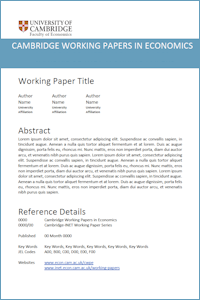
Nepal, R. and Jamasb, T.
Energy efficiency in Market vs Planned Economies: Evidence from Transition Countries
CWPE1345
Abstract: Economic theory suggests that market-based policies and reforms should promote energy efficiency in developing and transition countries. This paper, therefore, analyses the impacts of a varied set of market-oriented macro-level reforms on macro level energy efficiency across the transition countries. Since the early 1990s, these economies experienced a rapid marketization process which transformed them from central planning towards more market driven economies. The results from the relatively new bias corrected fixed-effect analysis (LSDVC) technique suggest that between 1990 and 2010, reforms in overall market liberalisation, financial sector and infrastructure industries, excluding the power sector, drove the energy efficiency improvements in these countries. Also, privatisation programmes only improved energy efficiency in the SEE countries. Thus, the empirical evidence support market driven energy efficiency policies aimed at addressing the market failures in the network industries and capital markets. We conclude that these results can help explain the energy efficiency policy puzzles in developing and transition countries where energy efficiency improvement can be a leading policy response to growing climate change and security of supply concerns.
Keywords: market reforms, energy efficiency , transition countries institutions
JEL Codes: P28 Q54 C33
PDF: https://www.econ.cam.ac.uk/research-files/repec/cam/pdf/cwpe1345.pdf 
EPRG Paper Link: 1322
Open Access Link: https://doi.org/10.17863/CAM.5721
